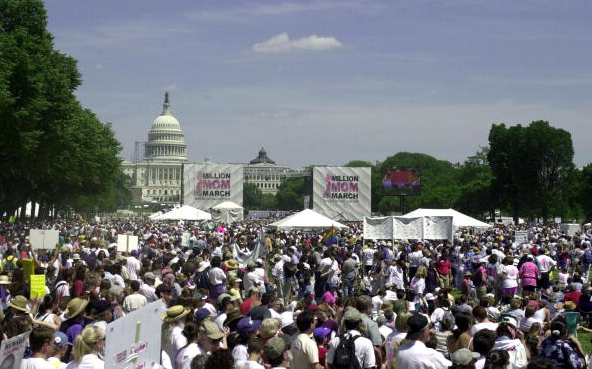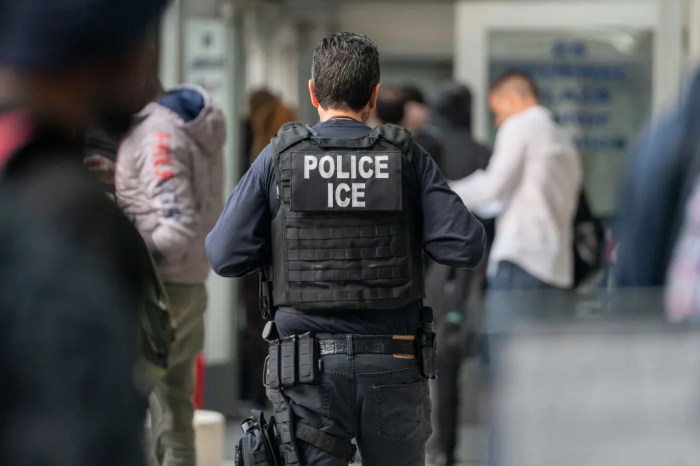It’s an image seared into the minds of mothers everywhere: a daisy chain of children being led out of a building, the dichotomy of sweetness and innocence against a backdrop of an unconscionable tragedy.
Gun violence in America has become so commonplace that it’s mostly the mass shootings that break through the airwaves, shocking an almost unshockable society. When the victims are children, that shock becomes outrage. And when outraged mothers organize, mountains can move.
Case in point: After five people, including three small children, were shot at a Jewish Community Center in California 15 years ago, Donna Dees, then a public relations associate for the Late Show with David Letterman, was so enraged that she gathered hundreds of thousands of fellow moms (and dads, grandparents, celebrities and other activists) to march on Mother’s Day 2000 in Washington, D.C. in the Million Mom March Against Gun Violence. Speakers included Rosie O’Donnell, Reese Witherspoon, Susan Sarandon, Roseanne Cash, Emmylou Harris, Melissa Etheridge, mothers of victims of the Columbine massacre, elected officials, surviving victims of gun violence themselves, and religious leaders across the country. Thursday marks the fifteenth anniversary of that monumental event—and they are still inspired, enraged and more coordinated than ever in their fight against gun violence as well as their push for common sense gun laws.
“It was August 10, 1999, a beautiful summer day,” recalls Dees. “At the time, I was living in Short Hills, New Jersey but was on Fire Island that particular evening. And there was a shooting earlier that day at a JCC day camp in Granada Hills, California. I turn on CNN showing the little daisy chain of kids with officers leading them out of this Jewish Center. I had a visceral reaction.”
That day, a white supremacist unloaded 70 gunshots at the day camp, wounding five, including three children.The gunman later murdered a postal worker who was delivering mail several miles away. After learning how disparate and ineffective American gun control laws are, Dees, whose children were then the same ages of the students who had been shot, thought she could use her PR experience and connections to help.
“I had worked in news for many, many years,” Dees tells the Press. “I remember so many school shootings. I never took action. Always felt like there was Sarah Brady out there, doing her job,” she adds, referring to the gun control activist and wife of Jim Brady, President Ronald Reagan’s press secretary who was seriously wounded during an assassination attempt in 1981. He died last August, and she died in April after leading the Brady Campaign to Prevent Gun Violence.
But, after mass shootings, volunteer organizations often get overwhelmed with activists looking to help. Dees couldn’t get anyone to return her phone calls, beyond requests for monetary donations, which she was happy to supply. She wanted to do more.
“I thought, ‘There must be mothers out here like me who are just completely outraged,’” Dees remembers. “So I went ahead and applied for a permit to march in Washington. I called it the Million Mom March, Mothers Day 2000.” With the rallying cry, “Looking for Few Good Moms to Mobilize for Common Sense Gun Laws,” a movement was born.
With key sponsorships from companies like Dannon Yogurt and iVillage.com, the Million Mom March was held on May 14, 2000, on the National Mall outside the Capitol. Still working in a part-time job share for Letterman, Dees launched what ultimately became a mission that consumed the majority of her time. Between organizing the march and crossing the country talking to PTAs, church groups and legislators about the need for background checks on gun buyers, Dees worked tirelessly to enact change.
She didn’t work alone.
Moms on The Ground
Dees credits the chutzpah and the camaraderie of her fellow women who created an atmosphere of tireless support that got the job done in nine months.
She recruited fellow professional moms, stay-at-home moms, friends, neighbors, and what she calls “play-date” moms. The march featured dozens of speakers, including former U.S. Rep. Carolyn McCarthy (D-Mineola); Commack-native Rosie O’Donnell; Patti Nielsen, an injured teacher from Columbine; Dawn Anna, the mother of a slain student; and too many gun violence survivors to list, including Mindy Finkelstein, a 16-year-old camp counselor shot at the JCC day-camp in 1999.
As many Long Islanders remember, McCarthy’s husband, Dennis, and son, Kevin, were both shot in the Long Island Rail Road massacre in 1993–a mass murder committed by Colin Ferguson, who killed six and wounded 19. Dennis died of his injuries. Kevin survived, but was severely wounded. McCarthy, a nurse at the time, was so outraged that she launched a campaign that propelled her to the U.S. House of Representatives, where she served the 4th district from 1997 until January of this year, when she retired after deciding not to run for re-election. Former Nassau County District Attorney Kathleen Rice has since been elected to fill her seat.
“When I finished speaking at the event…I was speaking to one woman’s husband who had asked her what she wanted for her anniversary and she said, ‘I want to go to Washington, I want to be a part of this movement to protect my child for the future,'” McCarthy remembers. “I tell you, my heart could have broken. There were so many stories like that, and it was just inspiring for me because I have to tell you trying to get anything done on gun violence in Washington has been quite difficult.”
McCarthy, who Politico described as “the fiercest gun-control advocate in Congress,” worked tirelessly to close loopholes in existing gun laws during her tenure, but couldn’t re-enact the assault weapons ban, curb the sale of high-capacity magazines or ensure background checks for sales at gun shows. Still, she remains optimistic.
“I think we’re in a much better place than we were certainly 15 years ago,” McCarthy tells the Press. “Do we know that it’s going to take time? Yes. But I’m more encouraged today than I’ve been. But many of us, especially those of us who have had personal tragedies in our lives, we’re not going to give up on this. I may not be in Congress, but I certainly plan on using my voice to reduce gun violence because most of us who got into this cause just didn’t want to see it happen to another family.
“We’re not going to win every battle,” she continued. “I understood that. I’ve spoken about that as being an ICU nurse. I couldn’t save every patient, but that didn’t stop me from going back to work every day and doing the best I could to protect those patients that I could.”
The March
Dees launched a whirlwind media tour that included press from NBC Nightly News, an Oprah Winfrey interview and spots on the Rosie O’Donnell Show. She found a captive audience of like-minded advocates who stepped up to donate time, money and support.
“The march was a huge success,” Dees tells the Press. “Seven-hundred-fifty-thousand at a minimum were there and we were low-balling that figure because any exaggeration would be challenged by the gun lobby. They just kept pouring in.”
Two stages had been set up at either edge of the Mall to accommodate everyone. Across the country, they had 77 sanctioned support marches, including 5,000 people in Oakland, Calif., on a rainy day. More than 5,000 in Chicago, Denver, Tucson, and Jackson, Mississippi. Ladies on a cold day in Juneau, Alaska, holding up signs.
Dees did not plan on continuing a movement.
“After the march, I don’t know why I foolishly thought I could go back to my life,” Dees recalls. She turned the database of activists over to the Bell Campaign and went back to the Late Show. But the movement didn’t leave her. With the 2000 Presidential election impending, Dees started educating voters about gun laws in their states and where their elected representatives stood on gun issues.
“The days I wasn’t working at CBS, I would be on the road to meet with whomever candidate that wanted the media attention,” says Dees. “Right up until the election, I was working this crazy schedule. Right from the march, to campaigning.”
In February of that year, Dees left Letterman to regain national control of the Million Mom March, which was in danger of collapsing from financial strain due to “too much interest, not enough resources,” according to Dees. The Million Mom March merged with the Brady Campaign, run by Sarah Brady, who died April 3.
“Most people think Sarah got involved because her husband was shot,” Dees tells the Press. “But it was only a couple of years later when she was in Illinois, and they were in somebody’s pickup truck and her son, Scott, reached under the seat and got a gun. It was the same [type of] gun that the shooter of Reagan and Jim Brady used. And that’s what incensed Sarah.”
Her son was 6 at the time. Sarah realized that if her son, who was aware of the dangers of handguns, wasn’t able to control his curiosity, she knew that would apply to other kids at that vulnerable age as well. That’s when she stepped up as an activist.
“Because we didn’t have social media back then, Sarah probably didn’t know the impact she had on people when she spoke to them,” Dees says. “She would go back to her home in Washington or Virginia and have no idea that she’d just inspired five women in a certain congressional district to take on their congressman.”
While the Million Mom March, in conjunction with the Brady Campaign and the Coalition to Stop Gun Violence, worked to educate voters and lobby for gun control legislation, they were out-organized and out-funded by pro-gun lobbyists such as the National Rifle Association. Still, the moms had some victories, such as stopping H&R Block from having an advertising partnership with the NRA. They staged protests and merged with other like-minded groups, such as the Protest Easy Guns in Virginia.
They also faced crushing defeats, most notably, the failure to renew the assault weapons ban when it expired in 2004, a decade after it had first passed. The moms had lobbied for its renewal, but Congress never let it get to a vote. Despite the advocates’ high hopes, the Obama administration did little to advance gun control legislation, even after former U.S. Rep. Gabby Giffords (D-Ariz.) was one of 13 people wounded in an Arizona shooting that killed six in 2011.
Then came the massacre at Sandy Hook Elementary School in Newtown, Conn., which left 20 children and six educators dead. Americans watched again as children were led out of their school building, hand-in-hand, an eerily similar daisy chain of senseless loss.
“When Obama said it was the worst day of his life, many of us in the movement knew he meant it,” Dees recalls. “We knew. He had ignored the issue and now he had to do something.”
Many believed that the massacre would lead to passage of long-sought gun control legislation, but just as the Million Mom March and the Brady Campaign saw increasing support, they also became the target of attacks to their credibility from the pro-gun lobby. A Long Island-based lawyer named Meg Farrell volunteered to help them fight back.
“I told Donna on day one, Churchill once said: ‘A lie makes its way around the world before the truth has a chance to put one leg in its pants,’” Farrell said in an email. “So, with tactical precision I did the research, conducted the analysis and was there as a strategic legal consultant to ensure the narrative, commentary and MMM reference was reported with accuracy. The scores of women who volunteered for years advocating for gun control and gun safety deserved proper historical reference and recognition. And the accurate historical narrative alongside the official documents I obtained, also gave the Brady Campaign the ammunition…to clean up the disinformation campaign against the Million Mom March.”
Together, these women collaborated to bring the disparate groups who supported the gun violence prevention movement together.
“This movement is really about the women who came before me, the Diane Feinsteins and the Carolyn McCarthys–it’s really been propelled and worked on by these women who are very selfless and will do anything, any job, no matter how thankless it is–to move the issue forward,” Dees said. “And that’s where I find myself here on our 15th anniversary.”
The core volunteer leadership of the original Million Mom March has decided to celebrate the anniversary with a “Moms in the House (as in House of Representatives)” Day in Washington, D.C. on Oct. 28, 2015. The goal is to reach out to the original MMM organizers to finish the job in Congress they started in 2000 by calling on supporters to help convince Congress to pass HR 1217, which was re-introduced with bi-partisan support to close the loopholes in the Brady background check bill.
“Over the course of the next few months, we will be recruiting 535 moms from across the country to join us in Washington, D.C. on October 28 to tell each member of Congress it is time for them to expand Brady background checks to all gun sales,” says Martina Leinz, who represents the MMM/Brady chapters on the Brady Campaign board of directors. “It is time for them to put the health and safety of our children ahead of the greedy interests of gun manufacturers who want to keep the lucrative criminal market wide open.”
The rallying cry is the same: Looking for a few good moms to mobilize for common sense gun laws.



































